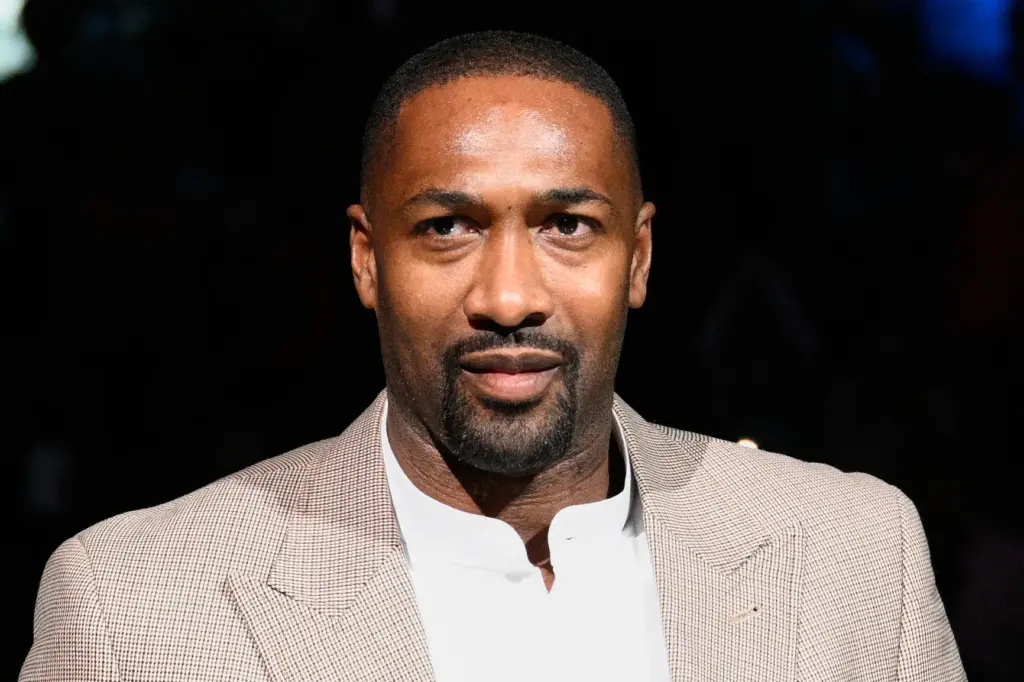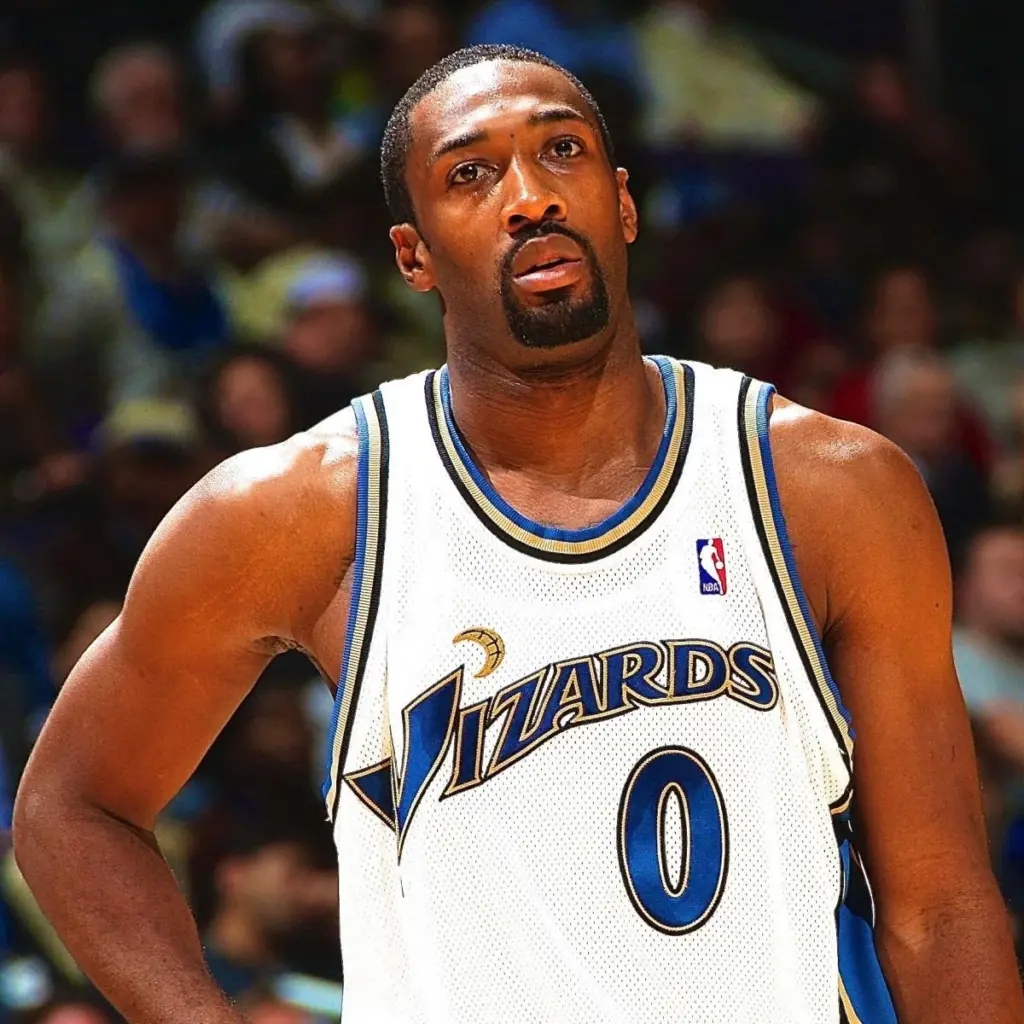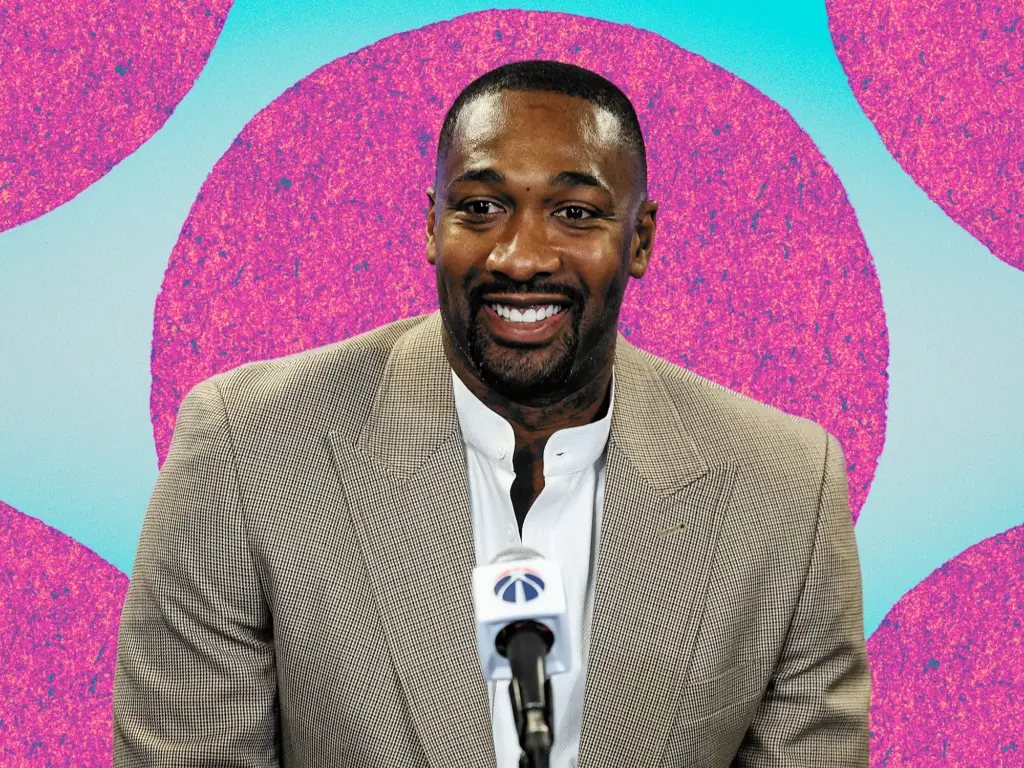Gilbert Arenas, once a household name in the NBA and often celebrated for his clutch performances and unapologetically outspoken personality, is now at the center of an investigation that could define his post-basketball legacy. Nicknamed “Agent Zero,” Arenas was as famous for his long-range shooting as he was for his offbeat sense of humor, making him a fan favorite and a staple on highlight reels throughout the mid-2000s. However, in recent years, his life after basketball has been punctuated by intrigue, periodic controversy, and now, a serious legal entanglement.
Arenas was arrested on suspicion of running illegal high-stakes poker games out of his mansion in Encino, California. This case, outlined by the U.S. Attorney’s Office, has sent shockwaves not only through sports circles but also the broader public, given the amount of money in play and the roster of characters involved. As legal proceedings begin to unfold, many wonder what this means for Arenas financially—and whether it could have lasting effects on his future prospects and reputation.
This article provides an in-depth examination of the scandal, the money that exchanged hands, how the fallout might impact Arenas’ finances, and offers a comprehensive review of his NBA earnings and ventures since retiring from professional basketball. We’ll also examine the recurring themes in Arenas’ life, including his relationship with gambling, and what this controversy could mean for the legacy of one of basketball’s most mercurial figures.

Details of the Allegations
The High-Stakes World Behind Closed Doors
On July 30, 2025, federal authorities announced that Gilbert Arenas, age 43, had been arrested alongside five others on allegations stemming from the operation of an illegal high-stakes gambling business. According to court documents and the U.S. Attorney’s press release, Arenas’ mansion in Encino became the nerve center for sophisticated poker nights. These weren’t casual gatherings; they were extravagant, tightly organized affairs where hundreds of thousands of dollars could change hands in a single evening.
The U.S. Department of Justice charged Arenas with one count of conspiracy to operate an illegal gambling business, one count of operating an illegal gambling business, and another count of making false statements to investigators who were probing the clandestine games. If convicted, Arenas faces up to five years in federal prison per count—a prospect that casts a long shadow over his future.
According to the indictment, Arenas allegedly worked with Arthur Kats—a local fixer known for arranging private parties—to stage his property and facilitate the operation. While Kats himself was not listed among the arrested individuals, his influence in orchestrating the setting was highlighted in the press release. Kats allegedly assisted in finding suitable hosts for the games, managing invitations for exclusive guests, and collecting rent, all in exchange for a share of the profits.
But Arenas and Kats didn’t operate in isolation. Additional suspects, including Yevgeni Gershman, Evgenni Tourevski, Allan Austria, and Yarin Cohen, were also charged. Gershman, described in court filings as a “suspected organized crime figure from Israel,” was responsible for some of the logistical elements, from tracking game attendance to handling wins and losses. Ievgen Krachun, another arrestee, was reportedly in charge of distributing chips and managing payouts, while ensuring the integrity of the night’s events.
The Anatomy of the Games
Sources familiar with the investigation describe a lavish operation that blended high-rolling risk with luxury and exclusivity. At these Encino mansion gatherings, participants reportedly included wealthy professionals, local celebrities, and individuals from the upper echelons of society. The preferred game was reportedly “Pot Limit Omaha”—a poker variant known for its complexity and massive pots, appealing to players willing to wager hundreds of thousands per hand.
The events themselves were meticulously orchestrated. The mansion would be staffed with private chefs preparing custom meals for guests, valets for luxury vehicles, and, according to the charges, armed security guards to maintain order and exclusivity. Female attendants were reportedly employed to serve drinks, provide massages, and, as alleged in the complaint, offer additional companionship to the players—adding an element of allure and decadence to the proceedings.
Arenas’ personal involvement is said to have gone beyond simply hosting; prosecutors allege he managed rent collection from the hosts, coordinated logistics, and shared in the house profits estimated to be substantial over the period the games operated. With large house fees collected from participant winnings, the operation allegedly raked in sizable profits, sometimes running multiple nights a week and attracting both repeat regulars and new faces drawn by the high stakes.
A source close to the investigation suggested, “These games weren’t the stuff of friendly, Saturday night poker. They were an enterprise, complete with payroll, risk assessments, and money management strategies more advanced than many small businesses.” Estimates place the total amount gambled at these gatherings into the millions of dollars, though the true scale may never be fully public.

Poker and the Perils of High Society
While poker has enjoyed a renaissance in popular culture, its illegal forms—especially at this scale—are often associated with risks beyond financial loss. The involvement of suspected organized crime, as mentioned in the case of Gershman, adds an ominous undertone and hints at ties to broader criminal enterprises. Investigators have also indicated that the network Arenas was involved with may have extended beyond the Los Angeles area, with similar high-stakes games believed to be operating in Las Vegas and New York, though Arenas’ role in those remains unclear.
The case has captured public attention for its blend of glitz and danger. “This is not just a case of some former NBA star looking for thrills,” said a DOJ spokesperson. “This was a sophisticated operation that brought together money, power, and influence, operating outside the bounds of the law.”
The Money on the Table: Finances of the Scandal
The Scale of Wagers
One of the most riveting aspects of the scandal is the sheer amount of money that appears to have exchanged hands. Illegal poker games of this variety routinely involve buy-ins ranging from $10,000 to $100,000 per player, with some private reports suggesting single pots exceeding a quarter of a million dollars. House fees, the primary income for the organizers, are typically set at 5-10% of each game’s pot, though the exact figure here is not public.
Estimating conservatively, if the Encino games attracted a dozen players with $50,000 buy-ins twice weekly, and if the house took a 7% fee, the organizers could be collecting as much as $84,000 per week in house revenue. Over the course of a year, that would total over $4 million—before factoring in additional side bets, food and drink charges, and potential “tips” for extra services.
The Cost of Getting Caught
While illegal gambling can be immensely profitable, it’s also fraught with financial peril. For Arenas, the greatest immediate risks are legal costs and potential criminal fines. Federal prosecution for illegal gambling can result in the forfeiture of assets believed to be connected to the crime—including real estate, vehicles, and cash. In addition to criminal penalties (which, per count, could reach five years in prison), convicted individuals are frequently subject to hefty financial penalties that can wipe out years of savings or investment.
Beyond legal penalties, Arenas may also face considerable civil liability—either from participants who lost money under allegedly unlawful conditions or from others affected by the operation. Experts note that notorious poker scandals often result in lawsuits from disgruntled players, especially if there are allegations of dishonesty, cheating, or manipulation.
If found guilty, Arenas could also lose endorsement deals or business partnerships, particularly those tied to his burgeoning career as a sports media personality and podcaster. Companies are quick to distance themselves from high-profile controversies, and public records indicate a number of pending brand opportunities could be in jeopardy.
Reputational Fallout and Future Earning Power
The reputational harm stemming from this case could have an exponential effect on Arenas’ earning ability. Brand experts agree that, while Arenas’ public persona has always been something of a “bad boy” in basketball circles, criminal convictions associated with gambling and organized crime are a different magnitude of bad publicity.
“Corporations can forgive eccentricity, even some forms of past controversy, but illegal gambling and crime are red lines for most brands,” said Dr. Marcus Barlow, a leading sports marketing analyst. As a result, Arenas’ ability to cash in on his legacy—through endorsements, appearances, or media projects—may be dramatically curtailed.
Unpacking the Financial Implications
Legal Fees, Fines, and Asset Forfeiture
High-profile criminal defenses, especially those involving multiple charges in federal court, can easily run into the millions of dollars. Legal experts estimate Arenas could face between $500,000 and $2 million in legal bills, depending on the complexity and length of the proceedings. If the government seeks restitution or forfeiture of proceeds believed to be the fruit of illegal activity, Arenas’ real estate and other significant assets could be endangered.
Federal fines for operating an illegal gambling enterprise vary but can reach into the hundreds of thousands of dollars per count. Additionally, asset forfeiture laws allow the federal government to seize any property “derived from or traceable” to proceeds of the illegal activity. For Arenas, who reportedly still owns several valuable homes—including the Encino mansion—this exposes a major slice of his net worth to government claims.
Tax Ramifications
Illegal earnings are still taxable income under U.S. law. If Arenas didn’t report proceeds from the alleged poker operation, he could face further investigation by the IRS for tax evasion—a charge that carries its own severe penalties. Even if acquitted of the gambling charges, a tax case could still result in major financial and criminal consequences, as seen previously with other celebrities brought down by tax controversies after escaping their initial charges.
Implications for Familial and Personal Wealth
Arenas’ familial responsibilities further amplify the potential fallout. With children, including a son, Alijah Arenas, who was expected to have a promising college basketball season at USC before suffering a recent meniscus injury, any financial strain affects not just Arenas, but his broader family. The potential for court-ordered penalties, combined with loss of income, could impact future generations.

Arenas’ Career Earnings and Net Worth: A Detailed Breakdown
NBA Contracts and Salary History
Gilbert Arenas entered the NBA as the 31st pick in the 2001 draft, beginning with a modest rookie contract with the Golden State Warriors. However, he rapidly outperformed his second-round status, earning the NBA’s Most Improved Player award in 2003 and subsequently signing a six-year, $65 million deal with the Washington Wizards—one of the largest contracts in the NBA at the time.
Following a period of stellar on-court performance, Arenas re-signed with the Wizards in 2008 for an even more staggering six-year, $111 million contract, despite lingering injuries. By the time his NBA career concluded after stints with the Orlando Magic and Memphis Grizzlies, Arenas had reportedly earned over $162 million in salary alone.
Endorsements and Off-Court Ventures
During his peak, Arenas’ quirky and magnetic personality made him a popular pitchman. He signed endorsement deals with Adidas (including his own signature shoe, the Adidas Gil Zero), Spalding, and other smaller brands. Estimates from sports business tracking firms suggest he earned between $5 million and $10 million over his playing career in endorsements—significant, though probably less than other NBA peers due to his off-court controversies.
Spending Habits and Investments
Arenas’ life off the court was often as headline-grabbing as his time on it. He famously shared stories about extravagant purchases, including custom cars, luxury jewelry, and even pet sharks. In a now-infamous interview, he admitted to spending over $1 million in a single day during a shopping spree. Such stories, though entertaining, have led analysts to wonder about the long-term staying power of his fortune.
After retiring from professional basketball, Arenas invested in real estate, accumulating several homes in California and Florida. Some of these assets are currently held in trust; others are reportedly mortgaged or otherwise leveraged—a common practice among former athletes seeking to maximize investment returns in high-value markets.
Post-NBA Income: Podcasting, Media, and Appearances
In recent years, Arenas reinvented himself as a media personality. His podcast, “Gil’s Arena,” quickly built a dedicated following among sports fans for its raw honesty and unique perspective on basketball culture. Branded as “unfiltered and unapologetic,” the show drew sponsorships from sports betting companies, beverage brands, and athletic apparel firms. He also appeared as a commentator on various NBA broadcasts, earning appearance fees and, at times, negotiating licensing deals for his name and likeness.
Revenue models for podcasts vary, but high-profile sports media figures like Arenas can reportedly earn anywhere between $100,000 and $1 million per year depending on listenership, ad revenue, and direct sponsorships. However, these deals are often contingent on maintaining a public image acceptable to mainstream brands.
Current Net Worth and Projections
Estimates of Arenas’ present net worth range from $20 million to $30 million, based on salary history, endorsed income, property holdings, and media activity. Such calculations, however, are fraught with uncertainty given his well-documented spending and the possibility of undisclosed debts or other obligations. The potential costs related to his legal battle—including fines, forfeitures, and lost opportunities—could result in a precipitous decline.
If forced to pay $2-3 million in legal and penalty costs, and lose key sponsorships or business contracts, Arenas’ effective net worth could drop below $10 million—still significant, but a steep fall for someone who once ranked among the NBA’s top earners.
Historical Context: A Life Intertwined with Risk and Controversy
The Guns-in-the-Locker Room Incident
Arenas was never a stranger to controversy during his playing career. In 2009, his involvement in a gambling-related dispute with a teammate led to one of the most notorious scandals in NBA history. Arenas admitted to bringing guns into the Washington Wizards’ locker room following an argument over unpaid card debts with teammate Javaris Crittenton. Both players were suspended; Arenas missed 50 games and lost tens of millions in future earnings as a result of the controversy.
The incident not only weakened his relationship with the Wizards, but with the league as a whole. Sponsors distanced themselves, and his image as basketball’s “lovable rogue” began to sour. It was a cautionary tale in the dangers of mixing competitive spirit, financial stakes, and unchecked bravado.
Gambling as a Recurring Theme
For Arenas, gambling has been a consistent subplot. Teammates and journalists regularly recounted stories of high-stakes card games on team planes, in hotels, and at offseason events. While such stories are not unique among professional athletes—who often socialize around poker or blackjack—Arenas’ involvement seemed unusually intense. Friends and observers worried aloud that his appetite for risk, both financial and reputational, was greater than most.

Attempts at Rehabilitation and Reinvention
Following his NBA career and the highly publicized scandals, Arenas made several efforts to rehabilitate his public image. He became more open in interviews about mental health, financial literacy, and life after basketball. His podcast often touches on these themes, and he’s participated in charity basketball events and youth mentorship programs. However, the latest allegations raise the question of whether his off-court troubles are a thing of the past or a persistent pattern.
Cultural Impact and the Public Eye
The Arenas poker scandal has prompted a broader conversation about the challenges faced by retired athletes, particularly those accustomed to fame and fortune. Financial planners estimate that a large percentage of NBA players face financial stress within five years of retirement, often due to mismanagement, risky investments, or simply the challenge of transitioning from multimillion-dollar salaries to more modest post-career incomes.
Some have questioned whether Arenas, whose charisma and humor made him a fan favorite, has struggled to find fulfillment away from the limelight. In the absence of structured competition, private gambling might fill the void once occupied by NBA action—a theory supported by sports psychologists who work with high-profile athletes.
Reactions from the Basketball Community
Arenas’ arrest has prompted a mix of shock, disappointment, and weary resignation in both the NBA community and among his fans. Several former teammates have expressed sadness at his predicament, noting that he was always someone who lived large—sometimes too large for his own good.
“Gil was an incredible talent but also someone who never really adjusted to the transition away from playing professionally,” said one former Wizards executive, speaking anonymously. “It’s another example of how difficult that jump can be, especially for players who tied so much of their identity to the game and the rewards it brought.”
Meanwhile, social media has exploded with contrasting opinions. Some fans rally behind Arenas, recalling his generosity and engaging personality. Others are quick to condemn, pointing to a pattern of poor decision-making and the apparent inability to leave behind the adrenaline rush of high-stakes risk.
Lessons and Broader Implications
The alleged activities at Arenas’ mansion serve as a cautionary tale—not just for athletes, but for anyone lured by the prospect of easy money and the thrill of bending (or breaking) the rules. It’s a reminder that wealth accumulated through hard work on the court or in the boardroom can be surprisingly fragile when confronted with the temptations and vulnerabilities of fame.
For the NBA, the case brings uncomfortable attention to the issue of gambling among its former and current players. In an era when legal sports betting is increasingly normalized, the line between lawful recreation and criminal activity can be easily crossed, especially when large sums and egos are involved.
Conclusion
The arrest and charging of Gilbert Arenas in connection with illegal high-stakes poker games mark a dramatic new chapter in the saga of a player once celebrated for his unorthodox style and fearless approach. While details will continue to emerge as the case makes its way through federal court, several truths are already clear: the amounts of money involved are enormous, the legal stakes are steep, and Arenas’ reputation, already complicated by past controversies, is once again at risk.
If convicted, Arenas stands to forfeit not just millions in assets and future earning power, but also the opportunity to reshape his public legacy for the better. This is a stark reminder that the rewards of a successful sporting career can vanish quickly in the face of unchecked risk and poor choices.
For basketball fans and observers, the Arenas case is both a fascinating story and a tragic one—a study in talent, temptation, and the perpetual challenge of navigating life after stardom. As both the legal and personal ramifications play out in the coming months, one thing is certain: the stakes for Gilbert Arenas have never been higher, and the outcome will be watched closely by sports enthusiasts, legal analysts, and anyone interested in the intersection of fame, finance, and fate.

